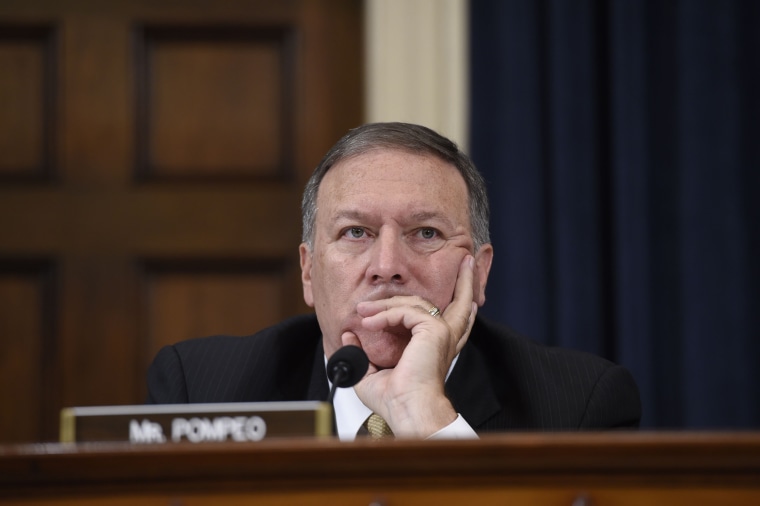Rep. Mike Pompeo, the Kansas congressman Donald Trump picked to lead the CIA, is a former Army officer and Harvard Law School graduate who is widely respected within the intelligence community for his intellect and his low key, analytical manner behind closed doors.
He also happens to be a conservative firebrand who sought to blame Hillary Clinton for the 2012 deaths of four Americans in Benghazi and vehemently opposed the Obama administration's nuclear deal with Iran, which intelligence officials say has kept Iran’s nuclear weapons capability in check.
Still, many CIA insiders were breathing a sigh of relief over Pompeo’s ascension Friday, calling him the most favorable option among the many names the Trump team recently had floated.
Intelligence officials regard Pompeo, who has been regularly interacting with them as a member of the House Permanent Subcommittee on Intelligence, as a savvy consumer of their product who respects the agency’s role. A graduate of the U.S. Military Academy at West Point, the Wichita Republican is seen as solid and strong-willed, all of which insiders see as a positives for the CIA … and for the national security community.
The top Democrat on the House Intelligence Committee, Rep. Adam Schiff, called Pompeo "very bright and hard-working."
"While we have had our share of strong differences — principally on the politicization of the tragedy in Benghazi — I know that he is someone who is willing to listen and engage, both key qualities in a CIA director," Schiff said in a statement Friday.
Rep. Devin Nunes (R.-Calif.) chairman of the House Intelligence Committee, praised Pompeo for "spend[ing] an immense amount of time in the field all across the world meeting with our intelligence professionals and service members on behalf of the House Intelligence Committee. One of the most respected voices in the House of Representatives on national security issues, Mike will undoubtedly develop a close working relationship with Congress in his new post. I am confident his nomination will be widely supported within the CIA, and I look forward to his fast approval by the Senate."
Pompeo sought to blame Hillary Clinton for the deaths of Americans when a U.S. Consulate was attacked Benghazi, Libya — and he accused her of misleading the American public. He also implied that the U.S. military should have been able to intervene to save the Americans. Multiple investigations found that no military response would have been possible in time, and failed to establish any wrongdoing by Clinton.
When Rep. Mike Rogers, then the chairman of the House intelligence committee, published a report that debunked some of the longstanding right-wing Benghazi theories, Pompeo added his own dissident views and criticized the Rogers report behind the scenes. Rogers was initially under consideration for CIA director, but he was ousted from the Trump transition team. It’s unclear to what extent, if any, the Benghazi case, an important factor for many Trump voters, played a role.
Current and former intelligence officials who have dealt with Pompeo said that he was playing to his Kansas base with the Benghazi matter, but that behind the scenes is a man with whom they can do business. He is an ardent opponent of the Iran deal and believes the Obama administration was soft on the Iranian regime. Trump’s national security advisor, Mike Flynn, shares his hard line on the Iran deal, which Trump has said he wants to renegotiate.
Pompeo’s first step, naming a deputy director, is considered critical. Traditionally, when an outsider like Pompeo is named CIA director, the deputy director tends to be an insider, a current or former CIA officer, usually from the clandestine services.
Leon Panetta for example, chose Steve Kappes, former director of the CIA's clandestine service (then called Directorate of Operations) as his deputy. If Pompeo makes a similar choice, the agency may embrace him.


